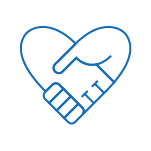
Our Guiding Principles of Social and Emotional Learning
To better understand emerging trends and established best practices, we have authored a guide which focuses on specific strategies which teachers can use to integrate SEL into academic instruction across PreK-12 classrooms.
↓
What is Social and Emotional Learning (SEL)?
According to CASEL, social-emotional learning can be defined as: "the process through which children and adults acquire and effectively apply the knowledge, attitudes, and skills necessary to understand and manage emotions, set and achieve positive goals, feel and show empathy for others, establish and maintain positive relationships, and make responsible decisions."

CREATE
Create nurturing spaces for students

INTEGRATE
Integrate SEL skill building into academics

INSTRUCT
Instruct SEL skills explicitly

REFLECT
Reflect on cultural aspect of SEL

RESPECT
Respect one's self and others

COMMUNICATE
Communicate about SEL with all stakeholders

EMPOWER
Empower students to take charge of their own SEL

CREATE
Create nurturing spaces for students

INTEGRATE
Integrate SEL skill building into academics

INSTRUCT
Instruct SEL skills explicitly

REFLECT
Reflect on cultural aspect of SEL

RESPECT
Respect one's self and others

COMMUNICATE
Communicate about SEL with all stakeholders

EMPOWER
Empower students to take charge of their own SEL

QUIZ #1: TRUE/FALSE
Educators cite Social and Emotional Learning as the biggest hurdle in Supporting English Learners.
TRUE: Educators cite Social and Emotional Learning as the biggest hurdle in Supporting English Learners
FALSE: Educators do not cite Social and Emotional Learning as the biggest hurdle in Supporting English Learners

QUICK QUIZ
You're right, this statement is TRUE
In our EL Survey, 77% of Teaches and 81% of Administrators agreed that social and emotional learning challenges presented a somewhat or extremely significant obstacle to effective EL instruction.

QUICK QUIZ
Sorry, this statement is not false, it is TRUE!
In our EL Survey, 77% of Teaches and 81% of Administrators agreed that social and emotional learning challenges presented a somewhat or extremely significant obstacle to effective EL instruction.

QUIZ #2: TRUE/FALSE
SEL Competencies Can Help Reduce Poverty and Improve Economic Mobility.
TRUE: SEL Competencies Can Help Reduce Poverty and Improve Economic Mobility
FALSE: SEL Competencies Cannot Help Reduce Poverty and Improve Economic Mobility

QUICK QUIZ
You're right, this statement is TRUE
SEL competencies are critically important for the long-term success of all students in today’s economy. A bipartisan 2015 report recommends several steps to scale up high-quality, evidence-based SEL programs as a core component of children’s education.

QUICK QUIZ
Sorry, this statement is not false, it is TRUE!
SEL competencies are critically important for the long-term success of all students in today’s economy. A bipartisan 2015 report recommends several steps to scale up high-quality, evidence-based SEL programs as a core component of children’s education.
What The Research Is Showing Us:
Researchers have found that instruction in SEL is as criticial to development and school success as academic instruction.
81%
of parents believe that SEL is just as important as academic learning, according to our 2018 Social and Emotional Learning Report
66.6%
of educators surveyed said their school is in the process of implementing a school-wide strategic SEL plan
75%
of teachers surveyed say they are teaching SEL in their classroom, and 74% of teachers say they are devoting more time to teaching SEL today compared to five years ago
64%
of teachers currently teaching SEL felt they were only "somewhat prepared" to teach SEL, and only 22% felt they were "very prepared"
51%
of the teachers said that the level of professional development offered on SEL at their school is not sufficient

91%
of educators are knowledgeable about their school’s district’s plans for teaching SEL skills today, compared to 77% in 2018.

56%
of educators report that their school has begun implementing an SEL plan.

34%
of administrators report their institution is using standalone SEL programs. This is more than double the 16% of administrators who did in 2018.

More than 80%
of parents believe that SEL is not emphasized as much as it should be, that it has become even more important since the beginning of the pandemic, and that it is helpful for children learning online.

81%
of parents believe that SEL is just as important as academic learning, according to our 2018 Social and Emotional Learning Report

94%
of educators are aware of SEL, compared to 83% in 2018.

Over 90%
of educators believe that SEL will help provide short-term benefits such as reduced behavioral problems, improved grades, and less emotional distress.

84%
of educators believe that incorporating SEL into the core curriculum has become more important since the pandemic.

Classroom Resources
Share SEL practices with your students by downloading and printing the poster to hang in your classroom, or download the guiding principles of SEL infographic.
Online Resources
 Opens in a new window.
Opens in a new window.Get the Full Survey Report

